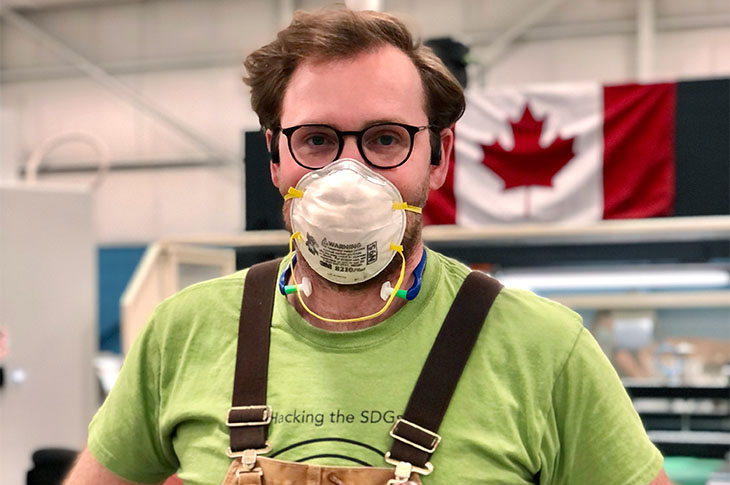Alumnus expands his business to supply face shields to front-line workers

If you had told Doug Braden five weeks ago that his company would grow from a staff of seven to over 100, he would sign a lease for a 50,000 square foot building he’s never seen, and he would be creating upwards of 50,000 face shields for the health care industry a day, he wouldn’t have believed you.
Braden, a 2011 graduate of SAIT’s Mechanical Engineering Technology program, and his business partners Jeremy Hedges and Andrew Brumwell, are the owners of InkSmith, an education technology startup located in Kitchener, Ontario. This time of year, they are usually working closely with teachers to introduce K – 12 students to robotics, 3D printing, and the principles of STEAM (science, technology, engineering, arts and math).
“We provide access to 3D printers and laser cutter machines that are user friendly and affordable. We hired practicing teachers and partnered with the Bachelor of Education program at Wilfrid Laurier University to build Ontario curriculum standard activities and to integrate our technology in a meaningful way for the students,” explains Braden.
In late 2019, the InkSmith team were already hearing about the impact COVID-19 was having on colleagues and businesses. The need to diversify or even change their business model was becoming increasingly necessary.
“We started thinking about what we could do for the education sector if schools were to shut down,” Braden adds. “We had some ideas about online learning but really, there is a lot of companies trying to fit into that same realm.”
Dr. Neil Naik from the Kitchener-Waterloo Academy of Medicine reached out to the InkSmith team and told them health care workers were in desperate need of personal protection equipment (PPE) and face shields.
That day, the team selected a 3D printable model for face shields, started printing them out, and The Canadian Shield was born. They found that it took an hour to create a single shield, so they set out drafting a laser-cut design to answer the need faster. They went from creating six shields a day to 8,000. And as quickly as demand for the shields increased, so did the cost and delivery times for supplies to fabricate them.
“We’ve been working with different levels of government and listening to what they want — they have told us what they need now and what they will need very soon,” says Braden. “It became evident to us that the supply chain for these critical materials needs to be in Canada.”
Within just over a week, after purchasing a new automated manufacturing machine, InkSmith’s entire capacity was focused on fabricating the face shields. At last count, Doug and his team had gone through more than 87 prototypes to create a shield that has extended use and can be produced at a lower cost to the health care system.
“Our face shields are reusable and can be sanitized with commonly found cleaners in hospitals. Where medical professionals would normally discard all of the PPE and put on new PPE between patients, they can now wipe down the face shield in about 30 seconds, reassemble it in about 15 seconds and then carry on with the next patient. What would normally get thrown out after 10 minutes of use, can be reused for two weeks.”
The Canadian Shield has customers in nearly every province and is focused on helping everyone that they can in Canada — from employing more than 100 people to providing opportunities to new Canadians, to delivering face shields to front-line workers.
“We’ve come from very humble beginnings and to grow so rapidly to help a massive number of people is unbelievable. It’s a pretty surreal thing to do this.”